International Human Resource Management: Ethics and CSR Management
VerifiedAdded on 2022/12/26
|9
|2764
|51
Report
AI Summary
This report examines the critical role of International Human Resource Management (IHRM) in navigating the complex landscape of ethics and Corporate Social Responsibility (CSR) within multinational corporations (MNCs). It highlights the interconnectedness of IHRM with ethical considerations, including employee treatment, fair practices in recruitment, diversity and inclusion, and the provision of safe working environments. The report delves into the challenges faced by IHRM in managing cross-cultural differences in ethical perceptions and ensuring consistent application of ethical standards across diverse global operations. Furthermore, it explores how IHRM contributes to CSR by fostering sustainability, promoting employee well-being, and aligning organizational structures with ethical values. The report also addresses the challenges IHRM faces in implementing ethical and CSR initiatives, such as balancing stakeholder interests, providing ethical training, and incorporating local community perspectives in decision-making processes. Overall, the report underscores the importance of IHRM in shaping ethical business practices and contributing to the long-term success and sustainability of MNCs in a globalized world.
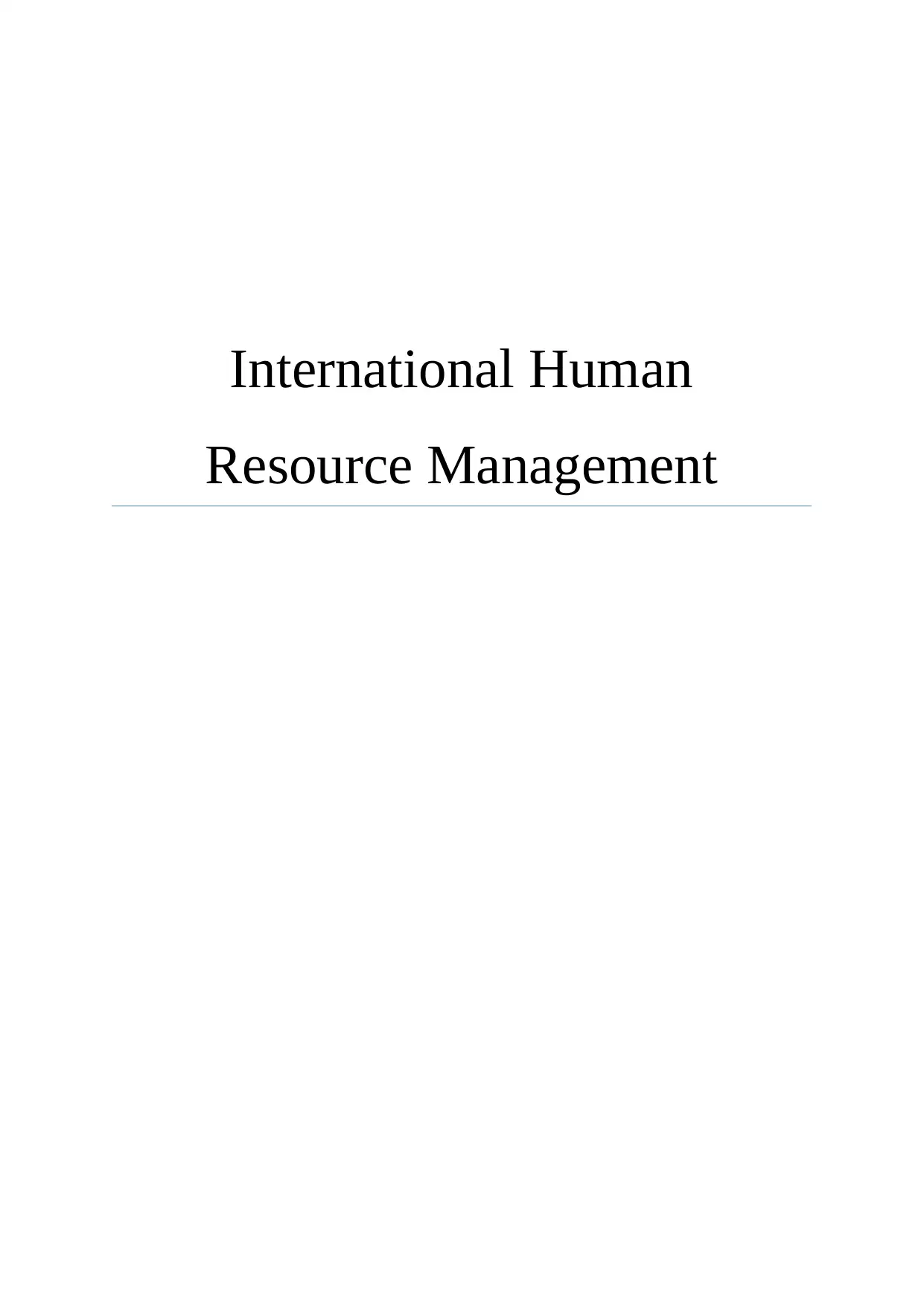
International Human
Resource Management
Resource Management
Paraphrase This Document
Need a fresh take? Get an instant paraphrase of this document with our AI Paraphraser
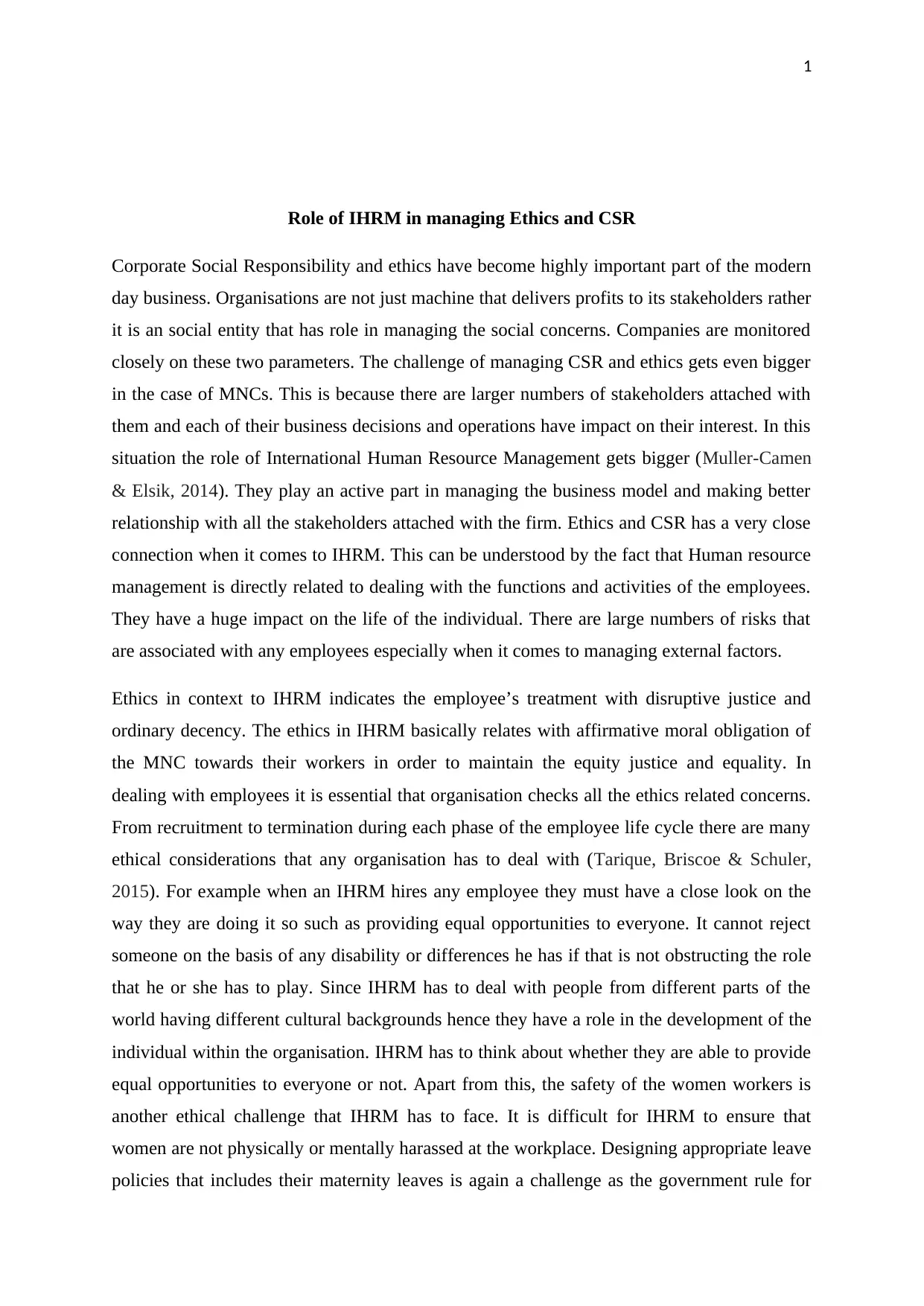
1
Role of IHRM in managing Ethics and CSR
Corporate Social Responsibility and ethics have become highly important part of the modern
day business. Organisations are not just machine that delivers profits to its stakeholders rather
it is an social entity that has role in managing the social concerns. Companies are monitored
closely on these two parameters. The challenge of managing CSR and ethics gets even bigger
in the case of MNCs. This is because there are larger numbers of stakeholders attached with
them and each of their business decisions and operations have impact on their interest. In this
situation the role of International Human Resource Management gets bigger (Muller-Camen
& Elsik, 2014). They play an active part in managing the business model and making better
relationship with all the stakeholders attached with the firm. Ethics and CSR has a very close
connection when it comes to IHRM. This can be understood by the fact that Human resource
management is directly related to dealing with the functions and activities of the employees.
They have a huge impact on the life of the individual. There are large numbers of risks that
are associated with any employees especially when it comes to managing external factors.
Ethics in context to IHRM indicates the employee’s treatment with disruptive justice and
ordinary decency. The ethics in IHRM basically relates with affirmative moral obligation of
the MNC towards their workers in order to maintain the equity justice and equality. In
dealing with employees it is essential that organisation checks all the ethics related concerns.
From recruitment to termination during each phase of the employee life cycle there are many
ethical considerations that any organisation has to deal with (Tarique, Briscoe & Schuler,
2015). For example when an IHRM hires any employee they must have a close look on the
way they are doing it so such as providing equal opportunities to everyone. It cannot reject
someone on the basis of any disability or differences he has if that is not obstructing the role
that he or she has to play. Since IHRM has to deal with people from different parts of the
world having different cultural backgrounds hence they have a role in the development of the
individual within the organisation. IHRM has to think about whether they are able to provide
equal opportunities to everyone or not. Apart from this, the safety of the women workers is
another ethical challenge that IHRM has to face. It is difficult for IHRM to ensure that
women are not physically or mentally harassed at the workplace. Designing appropriate leave
policies that includes their maternity leaves is again a challenge as the government rule for
Role of IHRM in managing Ethics and CSR
Corporate Social Responsibility and ethics have become highly important part of the modern
day business. Organisations are not just machine that delivers profits to its stakeholders rather
it is an social entity that has role in managing the social concerns. Companies are monitored
closely on these two parameters. The challenge of managing CSR and ethics gets even bigger
in the case of MNCs. This is because there are larger numbers of stakeholders attached with
them and each of their business decisions and operations have impact on their interest. In this
situation the role of International Human Resource Management gets bigger (Muller-Camen
& Elsik, 2014). They play an active part in managing the business model and making better
relationship with all the stakeholders attached with the firm. Ethics and CSR has a very close
connection when it comes to IHRM. This can be understood by the fact that Human resource
management is directly related to dealing with the functions and activities of the employees.
They have a huge impact on the life of the individual. There are large numbers of risks that
are associated with any employees especially when it comes to managing external factors.
Ethics in context to IHRM indicates the employee’s treatment with disruptive justice and
ordinary decency. The ethics in IHRM basically relates with affirmative moral obligation of
the MNC towards their workers in order to maintain the equity justice and equality. In
dealing with employees it is essential that organisation checks all the ethics related concerns.
From recruitment to termination during each phase of the employee life cycle there are many
ethical considerations that any organisation has to deal with (Tarique, Briscoe & Schuler,
2015). For example when an IHRM hires any employee they must have a close look on the
way they are doing it so such as providing equal opportunities to everyone. It cannot reject
someone on the basis of any disability or differences he has if that is not obstructing the role
that he or she has to play. Since IHRM has to deal with people from different parts of the
world having different cultural backgrounds hence they have a role in the development of the
individual within the organisation. IHRM has to think about whether they are able to provide
equal opportunities to everyone or not. Apart from this, the safety of the women workers is
another ethical challenge that IHRM has to face. It is difficult for IHRM to ensure that
women are not physically or mentally harassed at the workplace. Designing appropriate leave
policies that includes their maternity leaves is again a challenge as the government rule for
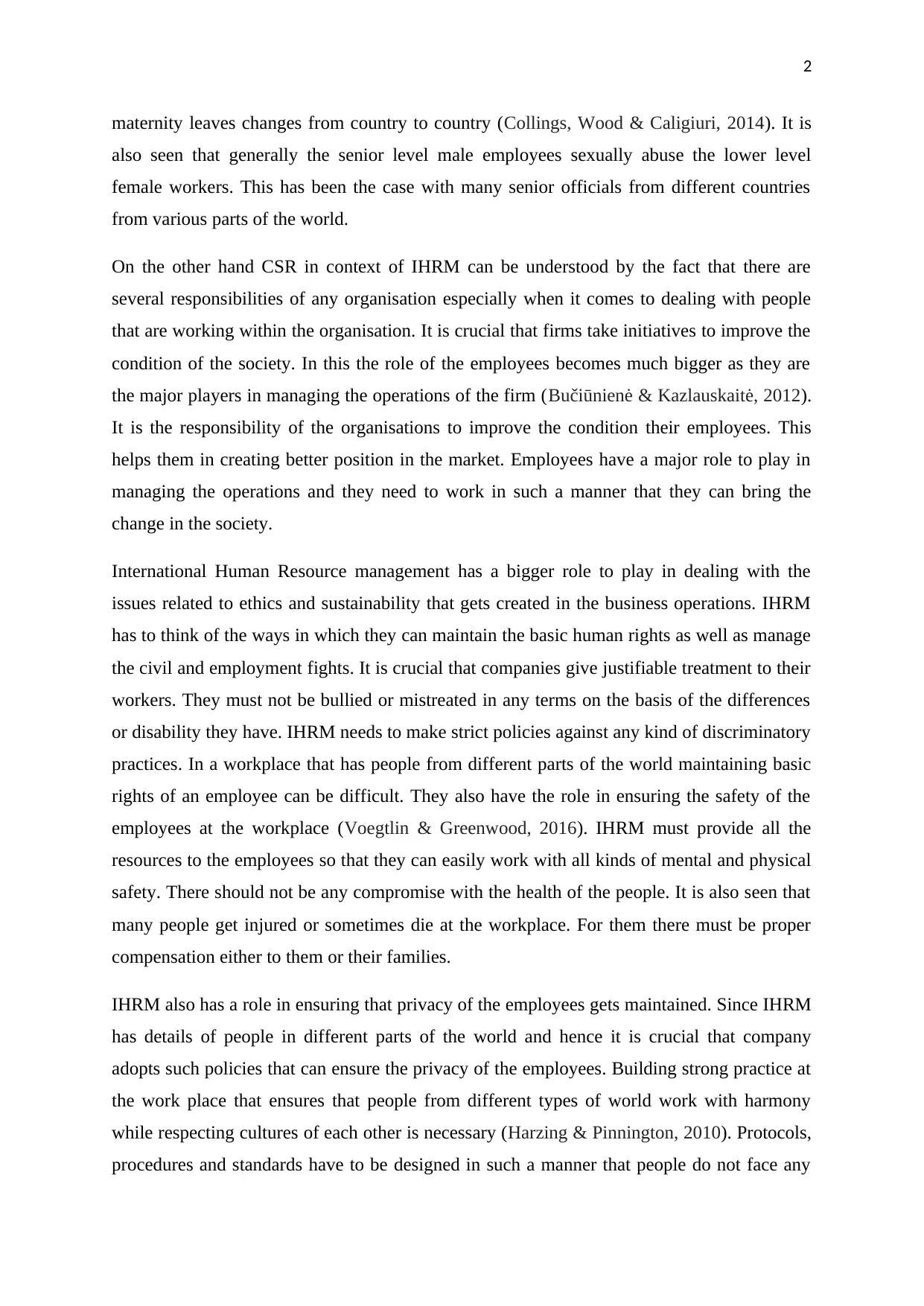
2
maternity leaves changes from country to country (Collings, Wood & Caligiuri, 2014). It is
also seen that generally the senior level male employees sexually abuse the lower level
female workers. This has been the case with many senior officials from different countries
from various parts of the world.
On the other hand CSR in context of IHRM can be understood by the fact that there are
several responsibilities of any organisation especially when it comes to dealing with people
that are working within the organisation. It is crucial that firms take initiatives to improve the
condition of the society. In this the role of the employees becomes much bigger as they are
the major players in managing the operations of the firm (Bučiūnienė & Kazlauskaitė, 2012).
It is the responsibility of the organisations to improve the condition their employees. This
helps them in creating better position in the market. Employees have a major role to play in
managing the operations and they need to work in such a manner that they can bring the
change in the society.
International Human Resource management has a bigger role to play in dealing with the
issues related to ethics and sustainability that gets created in the business operations. IHRM
has to think of the ways in which they can maintain the basic human rights as well as manage
the civil and employment fights. It is crucial that companies give justifiable treatment to their
workers. They must not be bullied or mistreated in any terms on the basis of the differences
or disability they have. IHRM needs to make strict policies against any kind of discriminatory
practices. In a workplace that has people from different parts of the world maintaining basic
rights of an employee can be difficult. They also have the role in ensuring the safety of the
employees at the workplace (Voegtlin & Greenwood, 2016). IHRM must provide all the
resources to the employees so that they can easily work with all kinds of mental and physical
safety. There should not be any compromise with the health of the people. It is also seen that
many people get injured or sometimes die at the workplace. For them there must be proper
compensation either to them or their families.
IHRM also has a role in ensuring that privacy of the employees gets maintained. Since IHRM
has details of people in different parts of the world and hence it is crucial that company
adopts such policies that can ensure the privacy of the employees. Building strong practice at
the work place that ensures that people from different types of world work with harmony
while respecting cultures of each other is necessary (Harzing & Pinnington, 2010). Protocols,
procedures and standards have to be designed in such a manner that people do not face any
maternity leaves changes from country to country (Collings, Wood & Caligiuri, 2014). It is
also seen that generally the senior level male employees sexually abuse the lower level
female workers. This has been the case with many senior officials from different countries
from various parts of the world.
On the other hand CSR in context of IHRM can be understood by the fact that there are
several responsibilities of any organisation especially when it comes to dealing with people
that are working within the organisation. It is crucial that firms take initiatives to improve the
condition of the society. In this the role of the employees becomes much bigger as they are
the major players in managing the operations of the firm (Bučiūnienė & Kazlauskaitė, 2012).
It is the responsibility of the organisations to improve the condition their employees. This
helps them in creating better position in the market. Employees have a major role to play in
managing the operations and they need to work in such a manner that they can bring the
change in the society.
International Human Resource management has a bigger role to play in dealing with the
issues related to ethics and sustainability that gets created in the business operations. IHRM
has to think of the ways in which they can maintain the basic human rights as well as manage
the civil and employment fights. It is crucial that companies give justifiable treatment to their
workers. They must not be bullied or mistreated in any terms on the basis of the differences
or disability they have. IHRM needs to make strict policies against any kind of discriminatory
practices. In a workplace that has people from different parts of the world maintaining basic
rights of an employee can be difficult. They also have the role in ensuring the safety of the
employees at the workplace (Voegtlin & Greenwood, 2016). IHRM must provide all the
resources to the employees so that they can easily work with all kinds of mental and physical
safety. There should not be any compromise with the health of the people. It is also seen that
many people get injured or sometimes die at the workplace. For them there must be proper
compensation either to them or their families.
IHRM also has a role in ensuring that privacy of the employees gets maintained. Since IHRM
has details of people in different parts of the world and hence it is crucial that company
adopts such policies that can ensure the privacy of the employees. Building strong practice at
the work place that ensures that people from different types of world work with harmony
while respecting cultures of each other is necessary (Harzing & Pinnington, 2010). Protocols,
procedures and standards have to be designed in such a manner that people do not face any
⊘ This is a preview!⊘
Do you want full access?
Subscribe today to unlock all pages.

Trusted by 1+ million students worldwide
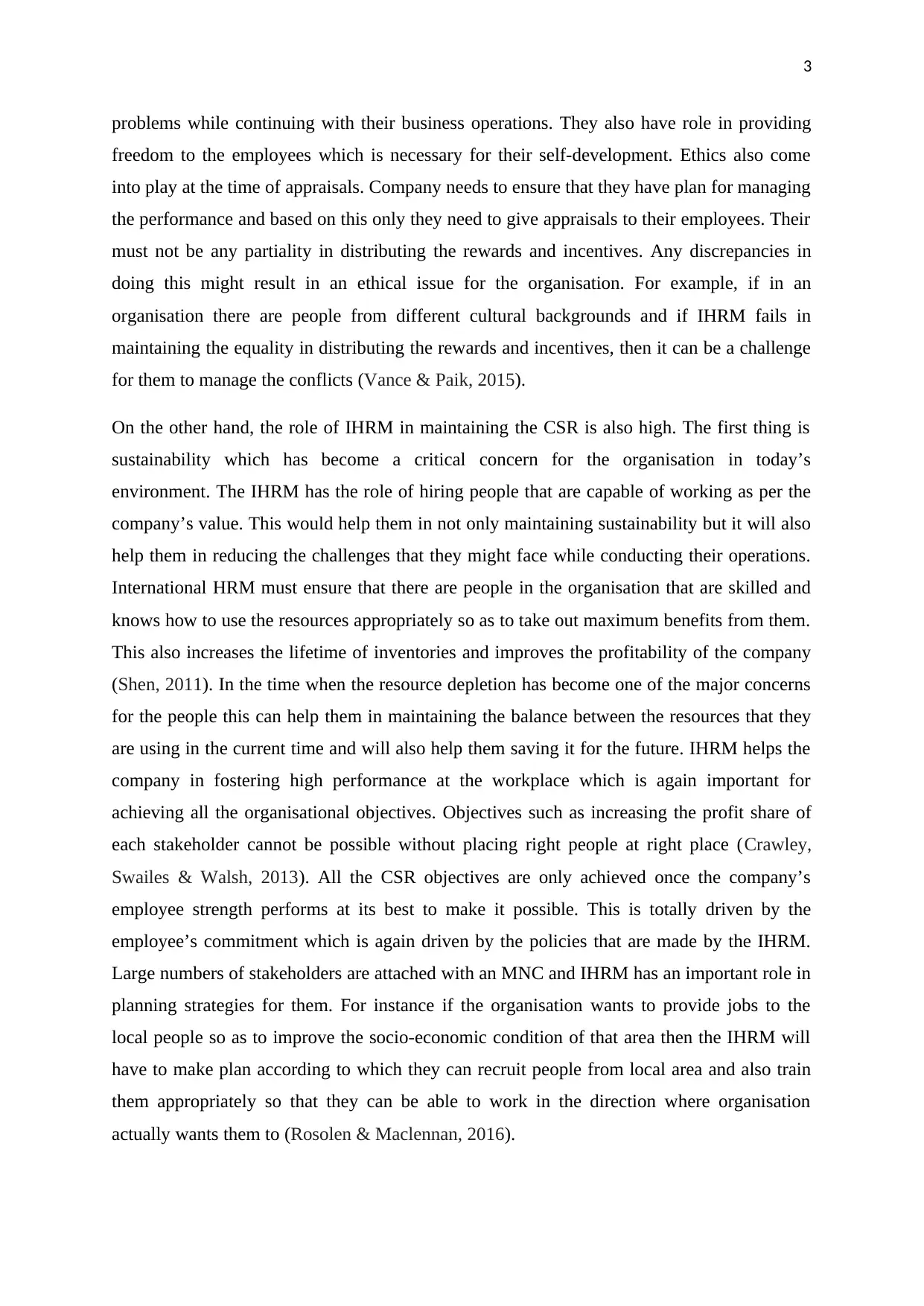
3
problems while continuing with their business operations. They also have role in providing
freedom to the employees which is necessary for their self-development. Ethics also come
into play at the time of appraisals. Company needs to ensure that they have plan for managing
the performance and based on this only they need to give appraisals to their employees. Their
must not be any partiality in distributing the rewards and incentives. Any discrepancies in
doing this might result in an ethical issue for the organisation. For example, if in an
organisation there are people from different cultural backgrounds and if IHRM fails in
maintaining the equality in distributing the rewards and incentives, then it can be a challenge
for them to manage the conflicts (Vance & Paik, 2015).
On the other hand, the role of IHRM in maintaining the CSR is also high. The first thing is
sustainability which has become a critical concern for the organisation in today’s
environment. The IHRM has the role of hiring people that are capable of working as per the
company’s value. This would help them in not only maintaining sustainability but it will also
help them in reducing the challenges that they might face while conducting their operations.
International HRM must ensure that there are people in the organisation that are skilled and
knows how to use the resources appropriately so as to take out maximum benefits from them.
This also increases the lifetime of inventories and improves the profitability of the company
(Shen, 2011). In the time when the resource depletion has become one of the major concerns
for the people this can help them in maintaining the balance between the resources that they
are using in the current time and will also help them saving it for the future. IHRM helps the
company in fostering high performance at the workplace which is again important for
achieving all the organisational objectives. Objectives such as increasing the profit share of
each stakeholder cannot be possible without placing right people at right place (Crawley,
Swailes & Walsh, 2013). All the CSR objectives are only achieved once the company’s
employee strength performs at its best to make it possible. This is totally driven by the
employee’s commitment which is again driven by the policies that are made by the IHRM.
Large numbers of stakeholders are attached with an MNC and IHRM has an important role in
planning strategies for them. For instance if the organisation wants to provide jobs to the
local people so as to improve the socio-economic condition of that area then the IHRM will
have to make plan according to which they can recruit people from local area and also train
them appropriately so that they can be able to work in the direction where organisation
actually wants them to (Rosolen & Maclennan, 2016).
problems while continuing with their business operations. They also have role in providing
freedom to the employees which is necessary for their self-development. Ethics also come
into play at the time of appraisals. Company needs to ensure that they have plan for managing
the performance and based on this only they need to give appraisals to their employees. Their
must not be any partiality in distributing the rewards and incentives. Any discrepancies in
doing this might result in an ethical issue for the organisation. For example, if in an
organisation there are people from different cultural backgrounds and if IHRM fails in
maintaining the equality in distributing the rewards and incentives, then it can be a challenge
for them to manage the conflicts (Vance & Paik, 2015).
On the other hand, the role of IHRM in maintaining the CSR is also high. The first thing is
sustainability which has become a critical concern for the organisation in today’s
environment. The IHRM has the role of hiring people that are capable of working as per the
company’s value. This would help them in not only maintaining sustainability but it will also
help them in reducing the challenges that they might face while conducting their operations.
International HRM must ensure that there are people in the organisation that are skilled and
knows how to use the resources appropriately so as to take out maximum benefits from them.
This also increases the lifetime of inventories and improves the profitability of the company
(Shen, 2011). In the time when the resource depletion has become one of the major concerns
for the people this can help them in maintaining the balance between the resources that they
are using in the current time and will also help them saving it for the future. IHRM helps the
company in fostering high performance at the workplace which is again important for
achieving all the organisational objectives. Objectives such as increasing the profit share of
each stakeholder cannot be possible without placing right people at right place (Crawley,
Swailes & Walsh, 2013). All the CSR objectives are only achieved once the company’s
employee strength performs at its best to make it possible. This is totally driven by the
employee’s commitment which is again driven by the policies that are made by the IHRM.
Large numbers of stakeholders are attached with an MNC and IHRM has an important role in
planning strategies for them. For instance if the organisation wants to provide jobs to the
local people so as to improve the socio-economic condition of that area then the IHRM will
have to make plan according to which they can recruit people from local area and also train
them appropriately so that they can be able to work in the direction where organisation
actually wants them to (Rosolen & Maclennan, 2016).
Paraphrase This Document
Need a fresh take? Get an instant paraphrase of this document with our AI Paraphraser
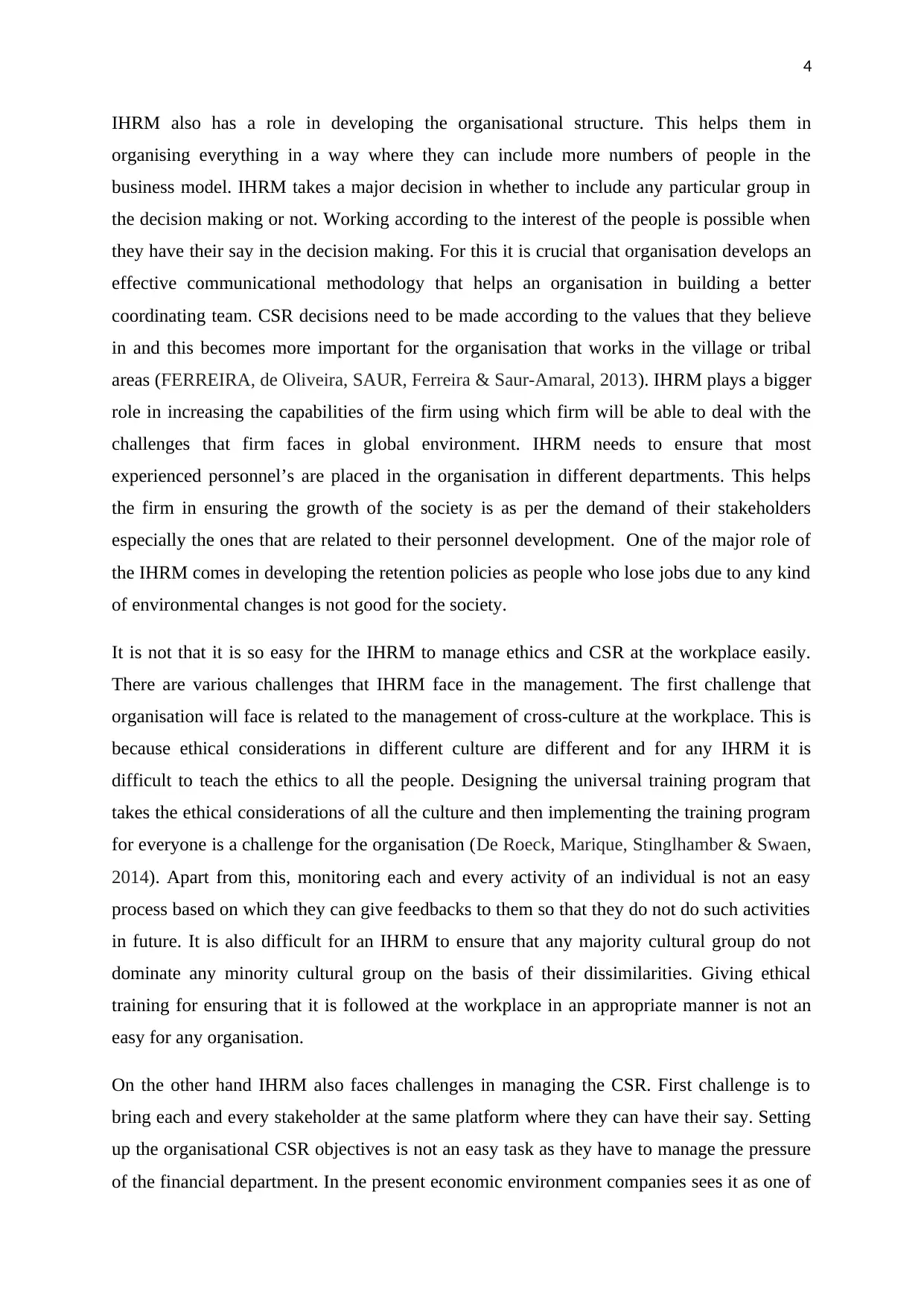
4
IHRM also has a role in developing the organisational structure. This helps them in
organising everything in a way where they can include more numbers of people in the
business model. IHRM takes a major decision in whether to include any particular group in
the decision making or not. Working according to the interest of the people is possible when
they have their say in the decision making. For this it is crucial that organisation develops an
effective communicational methodology that helps an organisation in building a better
coordinating team. CSR decisions need to be made according to the values that they believe
in and this becomes more important for the organisation that works in the village or tribal
areas (FERREIRA, de Oliveira, SAUR, Ferreira & Saur-Amaral, 2013). IHRM plays a bigger
role in increasing the capabilities of the firm using which firm will be able to deal with the
challenges that firm faces in global environment. IHRM needs to ensure that most
experienced personnel’s are placed in the organisation in different departments. This helps
the firm in ensuring the growth of the society is as per the demand of their stakeholders
especially the ones that are related to their personnel development. One of the major role of
the IHRM comes in developing the retention policies as people who lose jobs due to any kind
of environmental changes is not good for the society.
It is not that it is so easy for the IHRM to manage ethics and CSR at the workplace easily.
There are various challenges that IHRM face in the management. The first challenge that
organisation will face is related to the management of cross-culture at the workplace. This is
because ethical considerations in different culture are different and for any IHRM it is
difficult to teach the ethics to all the people. Designing the universal training program that
takes the ethical considerations of all the culture and then implementing the training program
for everyone is a challenge for the organisation (De Roeck, Marique, Stinglhamber & Swaen,
2014). Apart from this, monitoring each and every activity of an individual is not an easy
process based on which they can give feedbacks to them so that they do not do such activities
in future. It is also difficult for an IHRM to ensure that any majority cultural group do not
dominate any minority cultural group on the basis of their dissimilarities. Giving ethical
training for ensuring that it is followed at the workplace in an appropriate manner is not an
easy for any organisation.
On the other hand IHRM also faces challenges in managing the CSR. First challenge is to
bring each and every stakeholder at the same platform where they can have their say. Setting
up the organisational CSR objectives is not an easy task as they have to manage the pressure
of the financial department. In the present economic environment companies sees it as one of
IHRM also has a role in developing the organisational structure. This helps them in
organising everything in a way where they can include more numbers of people in the
business model. IHRM takes a major decision in whether to include any particular group in
the decision making or not. Working according to the interest of the people is possible when
they have their say in the decision making. For this it is crucial that organisation develops an
effective communicational methodology that helps an organisation in building a better
coordinating team. CSR decisions need to be made according to the values that they believe
in and this becomes more important for the organisation that works in the village or tribal
areas (FERREIRA, de Oliveira, SAUR, Ferreira & Saur-Amaral, 2013). IHRM plays a bigger
role in increasing the capabilities of the firm using which firm will be able to deal with the
challenges that firm faces in global environment. IHRM needs to ensure that most
experienced personnel’s are placed in the organisation in different departments. This helps
the firm in ensuring the growth of the society is as per the demand of their stakeholders
especially the ones that are related to their personnel development. One of the major role of
the IHRM comes in developing the retention policies as people who lose jobs due to any kind
of environmental changes is not good for the society.
It is not that it is so easy for the IHRM to manage ethics and CSR at the workplace easily.
There are various challenges that IHRM face in the management. The first challenge that
organisation will face is related to the management of cross-culture at the workplace. This is
because ethical considerations in different culture are different and for any IHRM it is
difficult to teach the ethics to all the people. Designing the universal training program that
takes the ethical considerations of all the culture and then implementing the training program
for everyone is a challenge for the organisation (De Roeck, Marique, Stinglhamber & Swaen,
2014). Apart from this, monitoring each and every activity of an individual is not an easy
process based on which they can give feedbacks to them so that they do not do such activities
in future. It is also difficult for an IHRM to ensure that any majority cultural group do not
dominate any minority cultural group on the basis of their dissimilarities. Giving ethical
training for ensuring that it is followed at the workplace in an appropriate manner is not an
easy for any organisation.
On the other hand IHRM also faces challenges in managing the CSR. First challenge is to
bring each and every stakeholder at the same platform where they can have their say. Setting
up the organisational CSR objectives is not an easy task as they have to manage the pressure
of the financial department. In the present economic environment companies sees it as one of
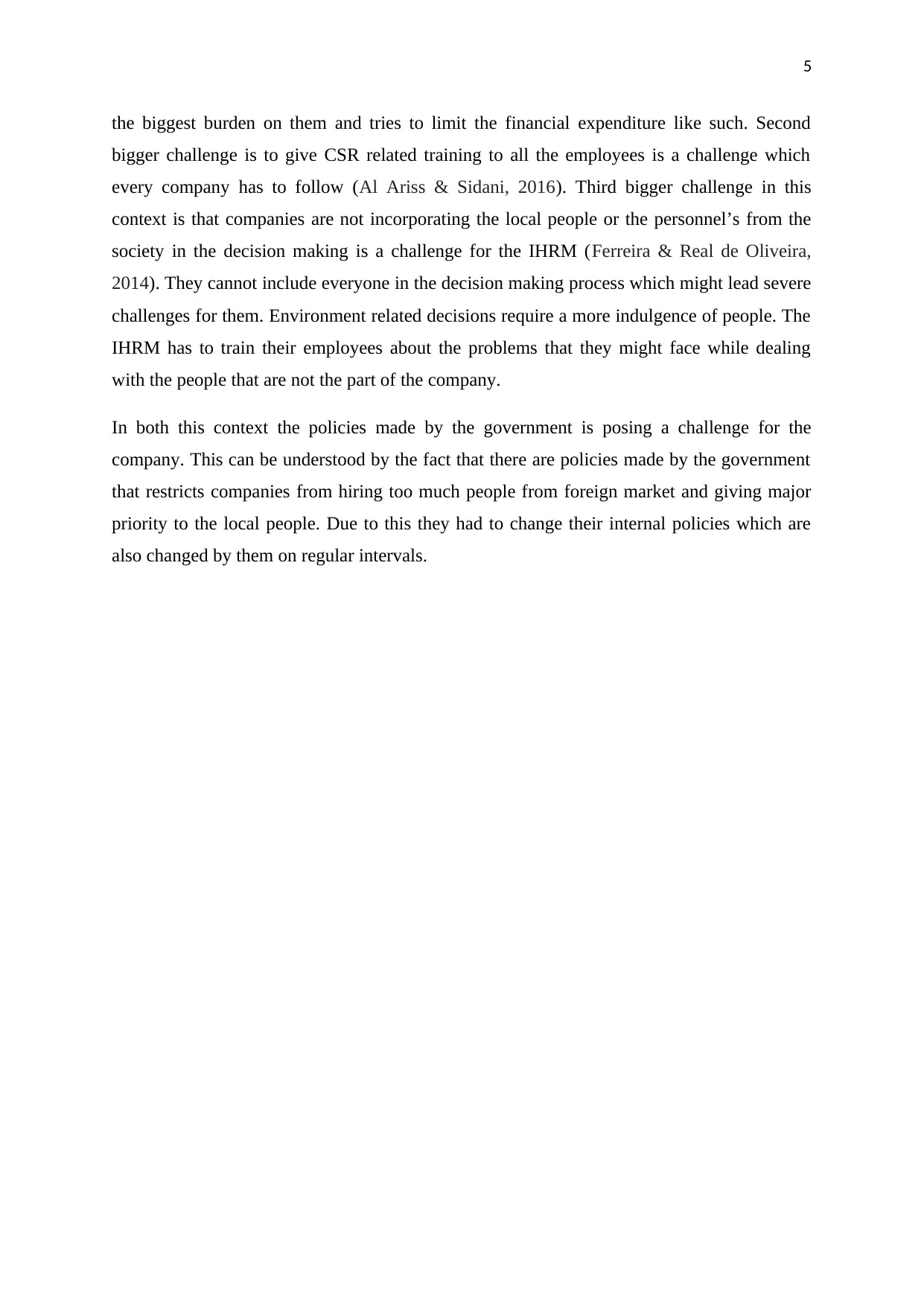
5
the biggest burden on them and tries to limit the financial expenditure like such. Second
bigger challenge is to give CSR related training to all the employees is a challenge which
every company has to follow (Al Ariss & Sidani, 2016). Third bigger challenge in this
context is that companies are not incorporating the local people or the personnel’s from the
society in the decision making is a challenge for the IHRM (Ferreira & Real de Oliveira,
2014). They cannot include everyone in the decision making process which might lead severe
challenges for them. Environment related decisions require a more indulgence of people. The
IHRM has to train their employees about the problems that they might face while dealing
with the people that are not the part of the company.
In both this context the policies made by the government is posing a challenge for the
company. This can be understood by the fact that there are policies made by the government
that restricts companies from hiring too much people from foreign market and giving major
priority to the local people. Due to this they had to change their internal policies which are
also changed by them on regular intervals.
the biggest burden on them and tries to limit the financial expenditure like such. Second
bigger challenge is to give CSR related training to all the employees is a challenge which
every company has to follow (Al Ariss & Sidani, 2016). Third bigger challenge in this
context is that companies are not incorporating the local people or the personnel’s from the
society in the decision making is a challenge for the IHRM (Ferreira & Real de Oliveira,
2014). They cannot include everyone in the decision making process which might lead severe
challenges for them. Environment related decisions require a more indulgence of people. The
IHRM has to train their employees about the problems that they might face while dealing
with the people that are not the part of the company.
In both this context the policies made by the government is posing a challenge for the
company. This can be understood by the fact that there are policies made by the government
that restricts companies from hiring too much people from foreign market and giving major
priority to the local people. Due to this they had to change their internal policies which are
also changed by them on regular intervals.
⊘ This is a preview!⊘
Do you want full access?
Subscribe today to unlock all pages.

Trusted by 1+ million students worldwide
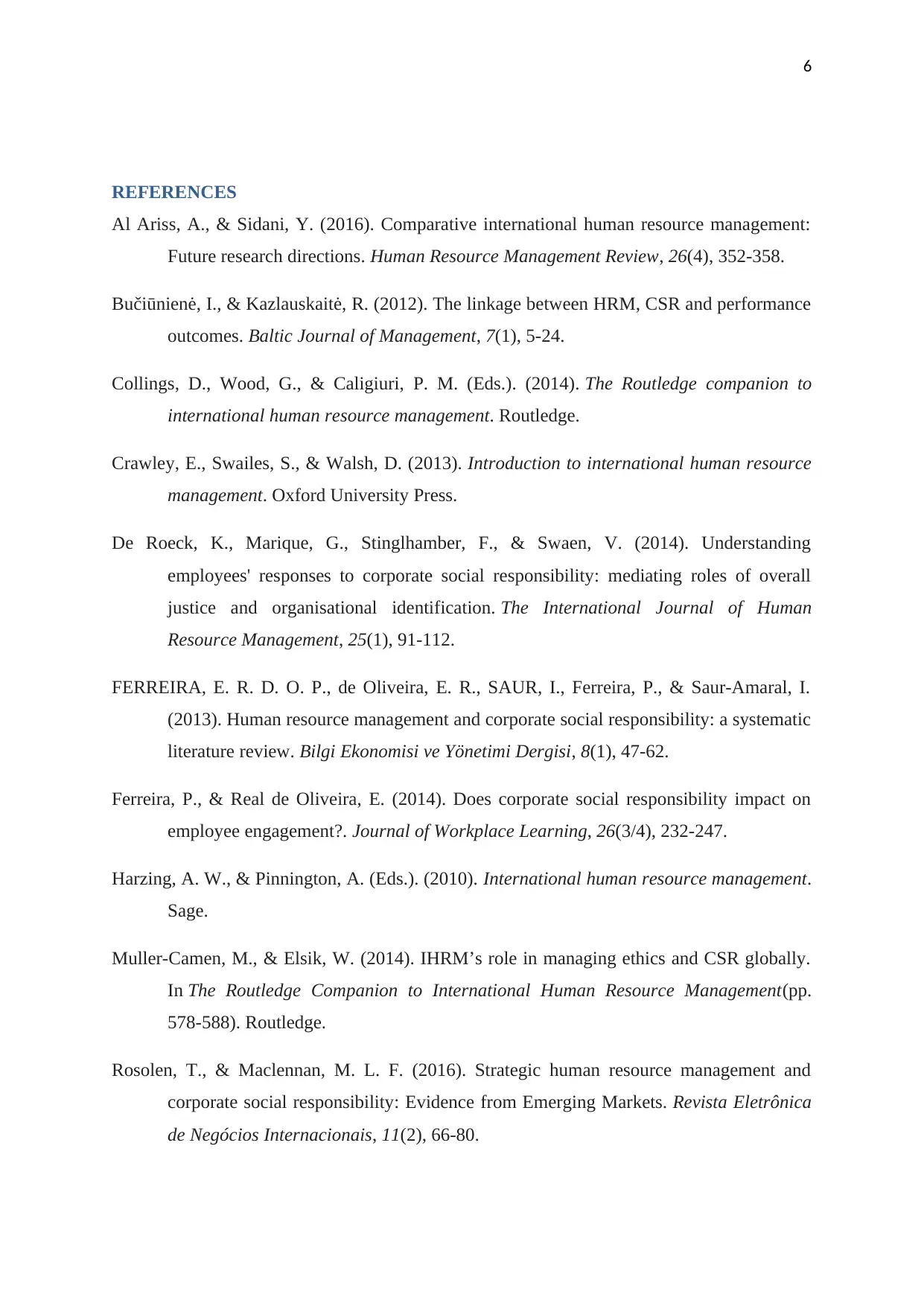
6
REFERENCES
Al Ariss, A., & Sidani, Y. (2016). Comparative international human resource management:
Future research directions. Human Resource Management Review, 26(4), 352-358.
Bučiūnienė, I., & Kazlauskaitė, R. (2012). The linkage between HRM, CSR and performance
outcomes. Baltic Journal of Management, 7(1), 5-24.
Collings, D., Wood, G., & Caligiuri, P. M. (Eds.). (2014). The Routledge companion to
international human resource management. Routledge.
Crawley, E., Swailes, S., & Walsh, D. (2013). Introduction to international human resource
management. Oxford University Press.
De Roeck, K., Marique, G., Stinglhamber, F., & Swaen, V. (2014). Understanding
employees' responses to corporate social responsibility: mediating roles of overall
justice and organisational identification. The International Journal of Human
Resource Management, 25(1), 91-112.
FERREIRA, E. R. D. O. P., de Oliveira, E. R., SAUR, I., Ferreira, P., & Saur-Amaral, I.
(2013). Human resource management and corporate social responsibility: a systematic
literature review. Bilgi Ekonomisi ve Yönetimi Dergisi, 8(1), 47-62.
Ferreira, P., & Real de Oliveira, E. (2014). Does corporate social responsibility impact on
employee engagement?. Journal of Workplace Learning, 26(3/4), 232-247.
Harzing, A. W., & Pinnington, A. (Eds.). (2010). International human resource management.
Sage.
Muller-Camen, M., & Elsik, W. (2014). IHRM’s role in managing ethics and CSR globally.
In The Routledge Companion to International Human Resource Management(pp.
578-588). Routledge.
Rosolen, T., & Maclennan, M. L. F. (2016). Strategic human resource management and
corporate social responsibility: Evidence from Emerging Markets. Revista Eletrônica
de Negócios Internacionais, 11(2), 66-80.
REFERENCES
Al Ariss, A., & Sidani, Y. (2016). Comparative international human resource management:
Future research directions. Human Resource Management Review, 26(4), 352-358.
Bučiūnienė, I., & Kazlauskaitė, R. (2012). The linkage between HRM, CSR and performance
outcomes. Baltic Journal of Management, 7(1), 5-24.
Collings, D., Wood, G., & Caligiuri, P. M. (Eds.). (2014). The Routledge companion to
international human resource management. Routledge.
Crawley, E., Swailes, S., & Walsh, D. (2013). Introduction to international human resource
management. Oxford University Press.
De Roeck, K., Marique, G., Stinglhamber, F., & Swaen, V. (2014). Understanding
employees' responses to corporate social responsibility: mediating roles of overall
justice and organisational identification. The International Journal of Human
Resource Management, 25(1), 91-112.
FERREIRA, E. R. D. O. P., de Oliveira, E. R., SAUR, I., Ferreira, P., & Saur-Amaral, I.
(2013). Human resource management and corporate social responsibility: a systematic
literature review. Bilgi Ekonomisi ve Yönetimi Dergisi, 8(1), 47-62.
Ferreira, P., & Real de Oliveira, E. (2014). Does corporate social responsibility impact on
employee engagement?. Journal of Workplace Learning, 26(3/4), 232-247.
Harzing, A. W., & Pinnington, A. (Eds.). (2010). International human resource management.
Sage.
Muller-Camen, M., & Elsik, W. (2014). IHRM’s role in managing ethics and CSR globally.
In The Routledge Companion to International Human Resource Management(pp.
578-588). Routledge.
Rosolen, T., & Maclennan, M. L. F. (2016). Strategic human resource management and
corporate social responsibility: Evidence from Emerging Markets. Revista Eletrônica
de Negócios Internacionais, 11(2), 66-80.
Paraphrase This Document
Need a fresh take? Get an instant paraphrase of this document with our AI Paraphraser
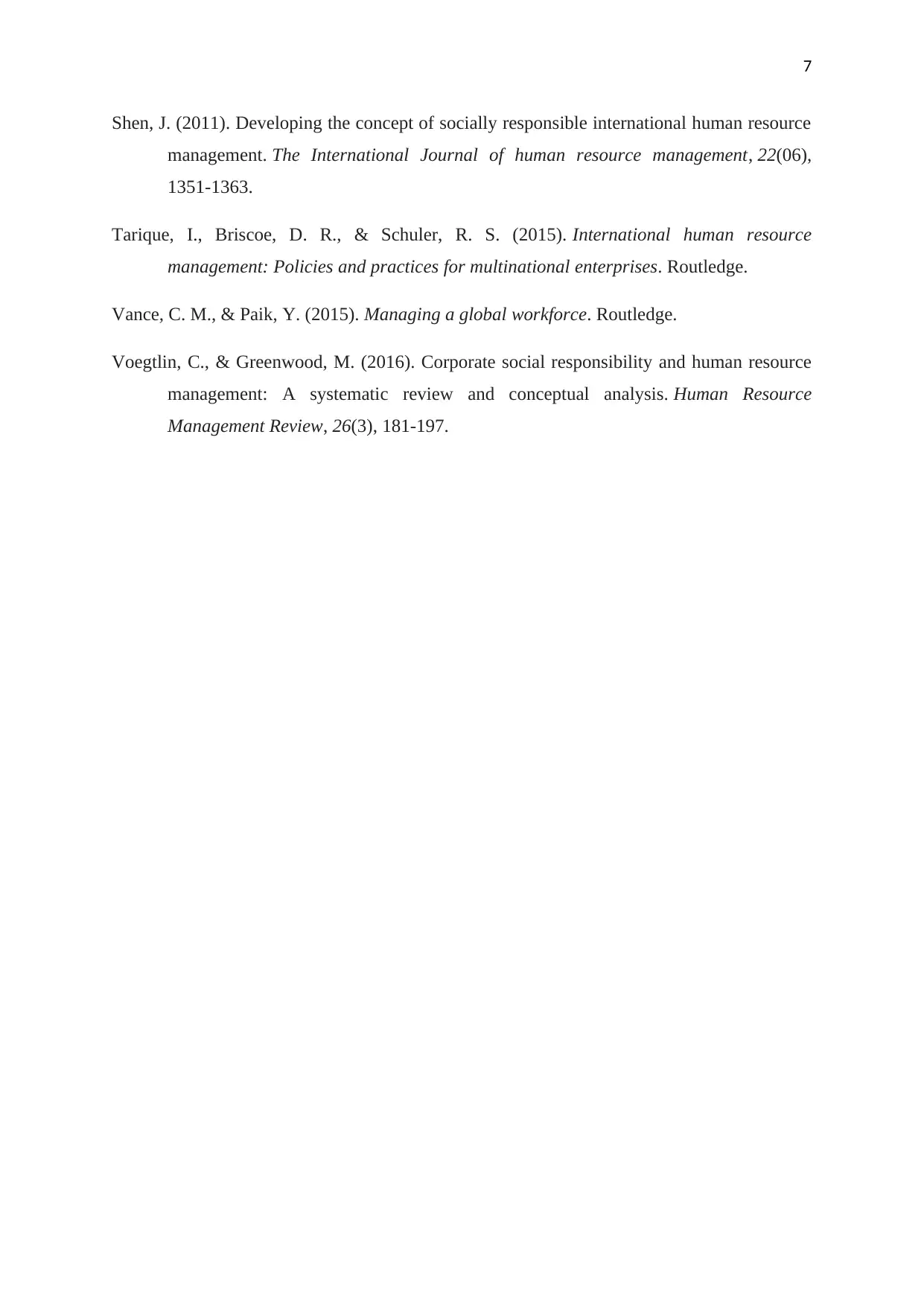
7
Shen, J. (2011). Developing the concept of socially responsible international human resource
management. The International Journal of human resource management, 22(06),
1351-1363.
Tarique, I., Briscoe, D. R., & Schuler, R. S. (2015). International human resource
management: Policies and practices for multinational enterprises. Routledge.
Vance, C. M., & Paik, Y. (2015). Managing a global workforce. Routledge.
Voegtlin, C., & Greenwood, M. (2016). Corporate social responsibility and human resource
management: A systematic review and conceptual analysis. Human Resource
Management Review, 26(3), 181-197.
Shen, J. (2011). Developing the concept of socially responsible international human resource
management. The International Journal of human resource management, 22(06),
1351-1363.
Tarique, I., Briscoe, D. R., & Schuler, R. S. (2015). International human resource
management: Policies and practices for multinational enterprises. Routledge.
Vance, C. M., & Paik, Y. (2015). Managing a global workforce. Routledge.
Voegtlin, C., & Greenwood, M. (2016). Corporate social responsibility and human resource
management: A systematic review and conceptual analysis. Human Resource
Management Review, 26(3), 181-197.

8
⊘ This is a preview!⊘
Do you want full access?
Subscribe today to unlock all pages.

Trusted by 1+ million students worldwide
1 out of 9
Related Documents
Your All-in-One AI-Powered Toolkit for Academic Success.
+13062052269
info@desklib.com
Available 24*7 on WhatsApp / Email
![[object Object]](/_next/static/media/star-bottom.7253800d.svg)
Unlock your academic potential
Copyright © 2020–2026 A2Z Services. All Rights Reserved. Developed and managed by ZUCOL.





